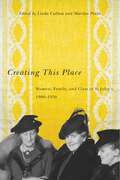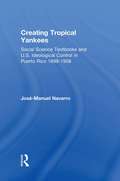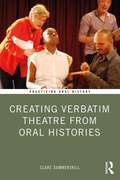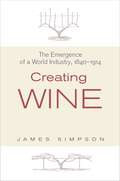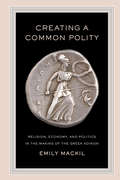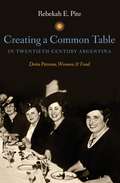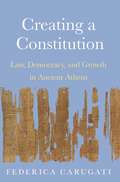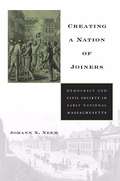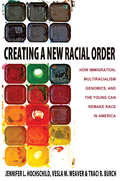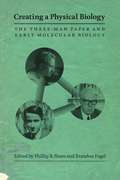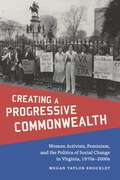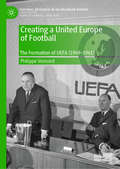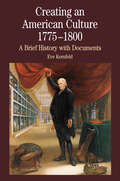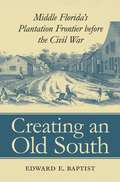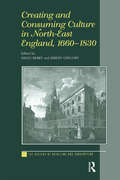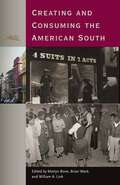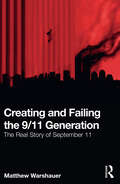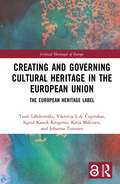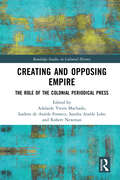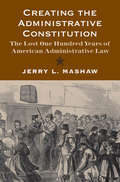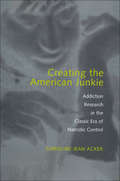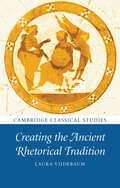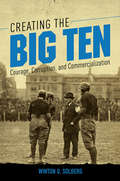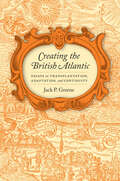- Table View
- List View
Creating This Place: Women, Family, and Class in St John's, 1900-1950
by Marilyn Porter Linda CullumThe women of St John's and the making of Newfoundland society.
Creating Tropical Yankees: Social Science Textbooks and U.S. Ideological Control in Puerto Rico, 1898-1908 (Latino Communities: Emerging Voices - Political, Social, Cultural and Legal Issues)
by Jose-Manuel NavarroFirst published in 2002. Routledge is an imprint of Taylor & Francis, an informa company.
Creating Verbatim Theatre from Oral Histories (Practicing Oral History)
by Clare SummerskillOffering a roadmap for practicing verbatim theatre (plays created from oral histories), this book outlines theatre processes through the lens of oral history and draws upon oral history scholarship to bring best practices from that discipline to theatre practitioners. This book opens with an overview of oral history and verbatim theatre, considering the ways in which existing oral history debates can inform verbatim theatre processes and highlights necessary ethical considerations within each field, which are especially prevalent when working with narrators from marginalised communities. It provides a step-by-step guide to creating plays from interviews and contains practical guidance for determining the scope of a theatre project: identifying narrators and conducting interviews, developing a script from excerpts of interview transcripts and outlining a variety of ways to create verbatim theatre productions. By bringing together this explicit discussion of oral history in relationship to theatre based on personal testimonies, the reader gains insight into each field and the close relationship between the two. Supported by international case studies that cover a wide range of working methods and productions, including The Laramie Project and Parramatta Girls, this is the perfect guide for oral historians producing dramatic representations of the material they have sourced through interviews, and for writers creating professional theatre productions, community projects or student plays.
Creating Wine: The Emergence of a World Industry, 1840-1914 (The Princeton Economic History of the Western World #36)
by James SimpsonToday's wine industry is characterized by regional differences not only in the wines themselves but also in the business models by which these wines are produced, marketed, and distributed. In Old World countries such as France, Spain, and Italy, small family vineyards and cooperative wineries abound. In New World regions like the United States and Australia, the industry is dominated by a handful of very large producers. This is the first book to trace the economic and historical forces that gave rise to very distinctive regional approaches to creating wine. James Simpson shows how the wine industry was transformed in the decades leading up to the First World War. Population growth, rising wages, and the railways all contributed to soaring European consumption even as many vineyards were decimated by the vine disease phylloxera. At the same time, new technologies led to a major shift in production away from Europe's traditional winemaking regions. Small family producers in Europe developed institutions such as regional appellations and cooperatives to protect their commercial interests as large integrated companies built new markets in America and elsewhere. Simpson examines how Old and New World producers employed diverging strategies to adapt to the changing global wine industry. Creating Wine includes chapters on Europe's cheap commodity wine industry; the markets for sherry, port, claret, and champagne; and the new wine industries in California, Australia, and Argentina.
Creating a Common Polity
by Emily MackilIn the ancient Greece of Pericles and Plato, the polis, or city-state, reigned supreme, but by the time of Alexander, nearly half of the mainland Greek city-states had surrendered part of their autonomy to join the larger political entities called koina. In the first book in fifty years to tackle the rise of these so-called Greek federal states, Emily Mackil charts a complex, fascinating map of how shared religious practices and long-standing economic interactions faciliated political cooperation and the emergence of a new kind of state. Mackil provides a detailed historical narrative spanning five centuries to contextualize her analyses, which focus on the three best-attested areas of mainland Greece--Boiotia, Achaia, and Aitolia. The analysis is supported by a dossier of Greek inscriptions, each text accompanied by an English translation and commentary.
Creating a Common Table in Twentieth-Century Argentina
by Rebekah E. PiteDona Petrona C. de Gandulfo (c. 1896-1992) reigned as Argentina's preeminent domestic and culinary expert from the 1930s through the 1980s. An enduring culinary icon thanks to her magazine columns, radio programs, and television shows, she was likely second only to Eva Peron in terms of the fame she enjoyed and the adulation she received. Her cookbook garnered tremendous popularity, becoming one of the three best-selling books in Argentina. Dona Petrona capitalized on and contributed to the growing appreciation for women's domestic roles as the Argentine economy expanded and fell into periodic crises. Drawing on a wide range of materials, including her own interviews with Dona Petrona's inner circle and with everyday women and men, Rebekah E. Pite provides a lively social history of twentieth-century Argentina, as exemplified through the fascinating story of Dona Petrona and the homemakers to whom she dedicated her career.Pite's narrative illuminates the important role of food--its consumption, preparation, and production--in daily life, class formation, and national identity. By connecting issues of gender, domestic work, and economic development, Pite brings into focus the critical importance of women's roles as consumers, cooks, and community builders.
Creating a Constitution: Law, Democracy, and Growth in Ancient Athens
by Federica CarugatiA comprehensive account of how the Athenian constitution was created—with lessons for contemporary constitution-buildingWe live in an era of constitution-making. More than half of the world's constitutions have been drafted in the past half-century. Yet, one question still eludes theorists and practitioners alike: how do stable, growth-enhancing constitutional structures emerge and endure? In Creating a Constitution, Federica Carugati argues that ancient Athens offers a unique laboratory for exploring this question. Because the city-state was reasonably well-documented, smaller than most modern nations, and simpler in its institutional makeup, the case of Athens reveals key factors of successful constitution-making that are hard to flesh out in more complex settings.Carugati demonstrates that the institutional changes Athens undertook in the late fifth century BCE, after a period of war and internal strife, amounted to a de facto constitution. The constitution restored stability and allowed the democracy to flourish anew. The analysis of Athens's case reveals the importance of three factors for creating a successful constitution: first, a consensus on a set of shared values capable of commanding long-term support; second, a self-enforcing institutional structure that reflects those values; and, third, regulatory mechanisms for policymaking that enable tradeoffs of inclusion to foster growth without jeopardizing stability.Uniquely combining institutional analysis, political economy, and history, Creating a Constitution is a compelling account of how political and economic goals that we normally associate with Western developed countries were once achieved through different institutional arrangements.
Creating a Nation of Joiners: Democracy and Civil Society in Early National Massachusetts
by Johann N. NeemThe book explores the multiple conflicts that produced a vibrant pluralistic civil society following the American Revolution. The story Neem tells is more pertinent for Americans and for those seeking to build civil societies around the world.
Creating a New Racial Order
by Vesla M. Weaver Jennifer L. Hochschild Traci R. BurchThe American racial order--the beliefs, institutions, and practices that organize relationships among the nation's races and ethnicities--is undergoing its greatest transformation since the 1960s. Creating a New Racial Order takes a groundbreaking look at the reasons behind this dramatic change, and considers how different groups of Americans are being affected. Through revealing narrative and striking research, the authors show that the personal and political choices of Americans will be critical to how, and how much, racial hierarchy is redefined in decades to come. The authors outline the components that make up a racial order and examine the specific mechanisms influencing group dynamics in the United States: immigration, multiracialism, genomic science, and generational change. Cumulatively, these mechanisms increase heterogeneity within each racial or ethnic group, and decrease the distance separating groups from each other. The authors show that individuals are moving across group boundaries, that genomic science is challenging the whole concept of race, and that economic variation within groups is increasing. Above all, young adults understand and practice race differently from their elders: their formative memories are 9/11, Hurricane Katrina, and Obama's election--not civil rights marches, riots, or the early stages of immigration. Blockages could stymie or distort these changes, however, so the authors point to essential policy and political choices. Portraying a vision, not of a postracial America, but of a different racial America, Creating a New Racial Order examines how the structures of race and ethnicity are altering a nation.
Creating a Physical Biology: The Three-Man Paper and Early Molecular Biology
by Phillip R. Sloan and Brandon FogelIn 1935 geneticist Nikolai Timoféeff-Ressovsky, radiation physicist Karl G. Zimmer, and quantum physicist Max Delbrück published “On the Nature of Gene Mutation and Gene Structure,” known subsequently as the “Three-Man Paper.” This seminal paper advanced work on the physical exploration of the structure of the gene through radiation physics and suggested ways in which physics could reveal definite information about gene structure, mutation, and action. Representing a new level of collaboration between physics and biology, it played an important role in the birth of the new field of molecular biology. The paper’s results were popularized for a wide audience in the What is Life? lectures of physicist Erwin Schrödinger in 1944. Despite its historical impact on the biological sciences, the paper has remained largely inaccessible because it was only published in a short-lived German periodical. Creating a Physical Biology makes the Three Man Paper available in English for the first time. Brandon Fogel’s translation is accompanied by an introductory essay by Fogel and Phillip Sloan and a set of essays by leading historians and philosophers of biology that explore the context, contents, and subsequent influence of the paper, as well as its importance for the wider philosophical analysis of biological reductionism.
Creating a Progressive Commonwealth: Women Activists, Feminism, and the Politics of Social Change in Virginia, 1970s-2000s (Making the Modern South)
by Megan Taylor ShockleyBuilding upon the work of late twentieth-century scholars in the field of feminist studies, Megan Taylor Shockley provides an in-depth look at feminism in the modern U.S. South. Shockley challenges the monolithic view of the region as a conservative bastion and argues that feminist advocates have provided crucial social progressive force, particularly in Virginia, between 1970 and 2010. An innovative study, Creating a Progressive Commonwealth illustrates how feminists in the state challenged the traditional patriarchal system and engaged directly with the legislature through grassroots educational efforts on three major initiatives: passage of the Equal Rights Amendment, protection of abortion rights, and pursuit of legal and social rights for survivors of domestic and sexual violence.Shockley suggests that advocates for gender equality fundamentally changed Virginia, improving the state’s support for women both personally and professionally as well as fostering an environment more conducive to additional progressive reform. In sharing the stories of these activists, the author discusses their initial choices to participate in the movement, the challenges they faced in promoting a progressive agenda, as well as their successes and failures. Throughout, Shockley emphasizes the need for scholars to look beyond the history of state legislatures in order to fully understand the nature of southern progressivism and feminism.Using both archival sources and oral histories, Creating a Progressive Commonwealth examines the individual women and their motivations as they battled recalcitrant legislators and conservative citizens to achieve social reforms.
Creating a United Europe of Football: The Formation of UEFA (1949–1961) (Football Research in an Enlarged Europe)
by Philippe VonnardThis book provides a historical study of the beginnings of the UEFA, demonstrating how the formation of the organisation was linked to the decentralisation experienced by FIFA, the world governing body of football. Vonnard examines why administrators created an association that transcended the barriers of the Cold War, and focused on the development of a network that promoted football outside the constraints of international politics. Finally, he emphasises the role UEFA played in the Europeanisation of the people’s game, and in the early years of the European integration process. The research is based on a rich body of new archival material from the UEFA and FIFA Documentation Centres, and various European football federations, as well as reports from a number of leading newspapers of the era, and interviews with football personalities of the 1950s. It will be of interest to students and scholars across the history of sport, international relations, and European studies
Creating an American Culture, 1775-1800: A Brief History with Documents
by Eve KornfeldExamining the efforts taken, during the Revolutionary War, of Noah Webster, Benjamin Rush, George Washington, Judith Sargent Murray, David Ramsay, Mercy Otis Warren, and others Creating an American Culture, 1775-1800 documents their attempt to invent a national literature, narrate a story of nationhood, and educate a diverse people for virtuous republican citizenship.
Creating an Old South
by Edward E. BaptistSet on the antebellum southern frontier, this book uses the history of two counties in Florida's panhandle to tell the story of the migrations, disruptions, and settlements that made the plantation South.Soon after the United States acquired Florida from Spain in 1821, migrants from older southern states began settling the land that became Jackson and Leon Counties. Slaves, torn from family and community, were forced to carve plantations from the woods of Middle Florida, while planters and less wealthy white men battled over the social, political, and economic institutions of their new society.Conflict between white men became full-scale crisis in the 1840s, but when sectional conflict seemed to threaten slavery, the whites of Middle Florida found common ground. In politics and everyday encounters, they enshrined the ideal of white male equality--and black inequality. To mask their painful memories of crisis, the planter elite told themselves that their society had been transplanted from older states without conflict. But this myth of an "Old," changeless South only papered over the struggles that transformed slave society in the course of its expansion. In fact, that myth continues to shroud from our view the plantation frontier, the very engine of conflict that had led to the myth's creation.
Creating and Consuming Culture in North-East England, 1660–1830 (The History of Retailing and Consumption)
by Jeremy Gregory Helen BerryHistorians of the long eighteenth century have recently recognised that this period is central both to the history of cultural production and consumption and to the history of national and regional identity. Yet no book has, as yet, directly engaged with these two areas of interest at the same time. By uniting interest in the history of culture with the history of regional identity, Creating and Consuming Culture in North-East England, 1660-1830 is of crucial importance to a wide range of historians and intervenes in a number of highly important historical and conceptual debates in a timely and provocative way. The book makes a substantial contribution to eighteenth-century studies. Not only do these essays demonstrate that in thinking about cultural production and consumption in the eighteenth century there are important continuities as well as changes that need to be considered, but also they complicate the commonplace assumption of metropolitan-led cultural change and cultural innovation. Rather than the usual model of centre-periphery diffusion, a number of contributions show that cultural change in the provinces was happening at the same time as in, or in some cases even before, London. The essays also indicate the complex relationship between cultural consumption and social status, with some cultural forms being more inclusive than others.
Creating and Consuming the American South
by Martyn Bone, Brian Ward, and William A. LinkThis book explores how an eclectic selection of narratives and images of the American South have been developed and disseminated. The contributors emphasize how ideas of “the South” have real social, political, and economic ramifications, and that they register at various local, regional, national, and transnational scales.
Creating and Failing the 9/11 Generation: The Real Story of September 11
by Matthew WarshauerThrough a chronological and thematical approach, this book examines the terrorist attacks on September 11, 2001 and the effect on what President George W. Bush recognized as the 9/11 Generation.By providing cultural and generational context to 9/11 and its impact on the U.S., this book is the first study to ensure that the voices of this young generation are put at the forefront of analysis. Creating and Failing the 9/11 Generation answers “what happened” and “why” but, more importantly, it reveals the importance of broader themes and ideas such as foreign policy, security, patriotism, the U.S. military, and American democracy. The final chapter, "9/11 and the World," places the events in America on a global scale and demonstrates how 9/11 has remained, and will remain, significant to understanding how different places and cultures interact with each other in the modern world.Creating and Failing the 9/11 Generation is useful for all students who study U.S. foreign relations, terrorism, warfare, memory studies, and the history of modern America.
Creating and Governing Cultural Heritage in the European Union: The European Heritage Label (Critical Heritages of Europe)
by Tuuli Lähdesmäki Katja Mäkinen Sigrid Kaasik-Krogerus Viktorija L.A. Čeginskas Johanna TurunenCreating and Governing Cultural Heritage in the European Union: The European Heritage Label provides an interdisciplinary examination of the ways in which European cultural heritage is created, communicated, and governed via the new European Heritage Label scheme. Drawing on ethnographic field research conducted across ten countries at sites that have been awarded with the European Heritage Label, the authors of the book approach heritage as an entangled social, spatial, temporal, discursive, narrative, performative, and embodied process. Recognising that heritage is inherently political and used by diverse actors as a tool for re-imagining communities, identities, and borders, and for generating notions of inclusion and exclusion in Europe, the book also considers the idea of Europe itself as a narrative. Chapters tackle issues such as multilevel governance of heritage; geopolitics of border-crossings and border-making; participation and non-participation; and embodiment and affective experience of heritage. Creating and Governing Cultural Heritage in the European Union advances heritage studies with an interdisciplinary approach that utilises and combines theories and conceptualizations from critical geopolitics, political studies, EU and European studies, cultural policy research, and cultural studies. As such, the volume will be of interest to scholars and students engaged in the study of heritage, politics, belonging, the EU, ideas, and narratives of Europe.
Creating and Opposing Empire: The Role of the Colonial Periodical Press (Routledge Studies in Cultural History)
by Adelaide Vieira Machado Isadora de Ataíde Fonseca Robert S. Newman Sandra Ataíde LoboFocusing on the Portuguese Empire, this book examines colonial press issued in "metropolitan" spaces and in colonies, disclosing dissonant narratives and problematizations of colonial empires. Creating and Opposing Empire is a venture of the International Group for Studies of Colonial Periodical Press of the Portuguese Empire (IGSCP-PE), which also invests on comparative studies and conceptual discussions. This book analyses representations of Empire at colonial press published in "metropolitan" spaces and in colonies. By joining these spaces in the same analytic look, it explores different problematizations of colonial empires. The diversity of angles discloses why a decolonized, democratic, understanding of the world modulated by modern colonial empires needs to navigate the seas of dissonant narratives of community, nation, and empire. The book deals with the ideas that in their complexity and dynamism, until late in the twentieth century, were moulded in the game between the cultural context of representations and the universality of concepts. The studies range from approaches to International Exhibitions, Metropolitan Press, Colonial Models, Missionary Press, Literary Discourses, Colonial and Postcolonial Press, Constructing the "Others", Anticolonial Press, Democracy, Dictatorship, Censorship, Colonial Prison’s Press, among other themes. Its primordial focus on the Portuguese Empire, introduces perspectives rarely included in international discussions on colonial and imperial press histories. This book is essential for scholars and students in Media Studies, Modern History, Cultural, Literary Studies and Political Science.
Creating and Opposing Empire: The Role of the Colonial Periodical Press (Routledge Studies in Cultural History)
by Adelaide Vieira Machado Isadora de Ataíde Fonseca Robert S. Newman Sandra Ataíde LoboFocusing on the Portuguese Empire, this book examines colonial press issued in "metropolitan" spaces and in colonies, disclosing dissonant narratives and problematizations of colonial empires.Creating and Opposing Empire is a venture of the International Group for Studies of Colonial Periodical Press of the Portuguese Empire (IGSCP-PE), which also invests on comparative studies and conceptual discussions. This book analyses representations of Empire at colonial press published in "metropolitan" spaces and in colonies. By joining these spaces in the same analytic look, it explores different problematizations of colonial empires. The diversity of angles discloses why a decolonized, democratic, understanding of the world modulated by modern colonial empires needs to navigate the seas of dissonant narratives of community, nation, and empire. The book deals with the ideas that in their complexity and dynamism, until late in the twentieth century, were moulded in the game between the cultural context of representations and the universality of concepts. The studies range from approaches to International Exhibitions, Metropolitan Press, Colonial Models, Missionary Press, Literary Discourses, Colonial and Postcolonial Press, Constructing the "Others", Anticolonial Press, Democracy, Dictatorship, Censorship, Colonial Prison’s Press, among other themes. Its primordial focus on the Portuguese Empire, introduces perspectives rarely included in international discussions on colonial and imperial press histories.This book is essential for scholars and students in Media Studies, Modern History, Cultural, Literary Studies and Political Science.
Creating the Administrative Constitution
by Jerry L. MashawThis groundbreaking book is the first to look at administration and administrative law in the earliest days of the American republic. Jerry Mashaw demonstrates that from the very beginning Congress delegated vast discretion to administrative officials and armed them with extrajudicial adjudicatory, rulemaking, and enforcement authority. The legislative and administrative practices of the U. S. Constitution’s first century created an administrative constitution hardly hinted at in its formal text. This book, in the author’s words, will "demonstrate that there has been no precipitous fall from a historical position of separation-of-powers grace to a position of compromise; there is not a new administrative constitution whose legitimacy should be understood as not only contestable but deeply problematic. "
Creating the American Junkie: Addiction Research in the Classic Era of Narcotic Control
by Caroline Jean AckerHeroin was only one drug among many that worried Progressive Era anti-vice reformers, but by the mid-twentieth century, heroin addiction came to symbolize irredeemable deviance. Creating the American Junkie examines how psychiatrists and psychologists produced a construction of opiate addicts as deviants with inherently flawed personalities caught in the grip of a dependency from which few would ever escape. Their portrayal of the tough urban addict helped bolster the federal government's policy of drug prohibition and created a social context that made the life of the American heroin addict, or junkie, more, not less, precarious in the wake of Progressive Era reforms.Weaving together the accounts of addicts and researchers, Acker examines how the construction of addiction in the early twentieth century was strongly influenced by the professional concerns of psychiatrists seeking to increase their medical authority; by the disciplinary ambitions of pharmacologists to build a drug development infrastructure; and by the American Medical Association's campaign to reduce prescriptions of opiates and to absolve physicians in private practice from the necessity of treating difficult addicts as patients. In contrast, early sociological studies of heroin addicts formed a basis for criticizing the criminalization of addiction. By 1940, Acker concludes, a particular configuration of ideas about opiate addiction was firmly in place and remained essentially stable until the enormous demographic changes in drug use of the 1960s and 1970s prompted changes in the understanding of addiction—and in public policy.
Creating the Ancient Rhetorical Tradition (Cambridge Classical Studies)
by Laura ViidebaumThis book explores the history of rhetorical thought and examines the gradual association of different aspects of rhetorical theory with two outstanding fourth-century BCE writers: Lysias and Isocrates. It highlights the parallel development of the rhetorical tradition that became understood, on the one hand, as a domain of style and persuasive speech, associated with the figure of Lysias, and, on the other, as a kind of philosophical enterprise which makes significant demands on moral and political education in antiquity, epitomized in the work of Isocrates. There are two pivotal moments in which the two rhetoricians were pitted against each other as representatives of different modes of cultural discourse: Athens in the fourth century BCE, as memorably portrayed in Plato's Phaedrus, and Rome in the first century BCE when Dionysius of Halicarnassus proposes to create from the united Lysianic and Isocratean rhetoric the foundation for the ancient rhetorical tradition.
Creating the Big Ten: Courage, Corruption, and Commercialization
by Winton U SolbergBig Ten football fans pack gridiron cathedrals that hold up to 100,000 spectators. The conference's fourteen member schools share a broadcast network and a 2016 media deal worth $2.64 billion. This cultural and financial colossus grew out of a modest 1895 meeting that focused on football's brutality and encroaching professionalism in the game. Winton U. Solberg explores the relationship between higher education and collegiate football in the Big Ten's first fifty years. This formative era saw debates over eligibility and amateurism roil the sport. In particular, faculty concerned with academics clashed with coaches, university presidents, and others who played to win. Solberg follows the conference's successful early efforts to put the best interests of institutions and athletes first. Yet, as he shows, commercial concerns undid such work after World War I as sports increasingly eclipsed academics. By the 1940s, the Big Ten's impact on American sports was undeniable. It had shaped the development of intercollegiate athletics and college football nationwide while serving as a model for other athletic conferences.
Creating the British Atlantic: Essays on Transplantation, Adaptation, and Continuity (Early American Histories)
by Jack P. GreeneSet mostly within an expansive British imperial and transatlantic framework, this new selection of writings from the renowned historian Jack P. Greene draws on themes he has been developing throughout his distinguished career. In these essays Greene explores the efforts to impose Old World institutions, identities, and values upon the New World societies being created during the colonization process. He shows how transplanted Old World components—political, legal, and social—were adapted to meet the demands of new, economically viable, expansive cultural hearths. Greene argues that these transplantations and adaptations were of fundamental importance in the formation and evolution of the new American republic and the society it represented.The scope of this work allows Greene to consider in depth numerous subjects, including the dynamics of colonization, the development and character of provincial identities, the relationship between new settler societies in America and the emerging British Empire, and the role of cultural power in social and political formation.
